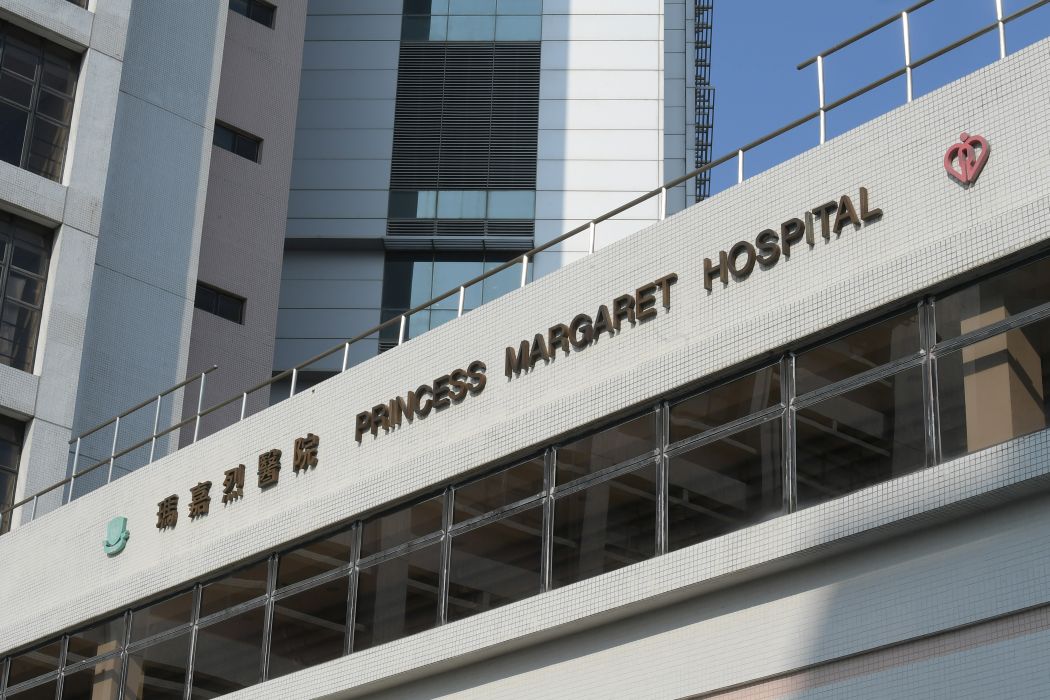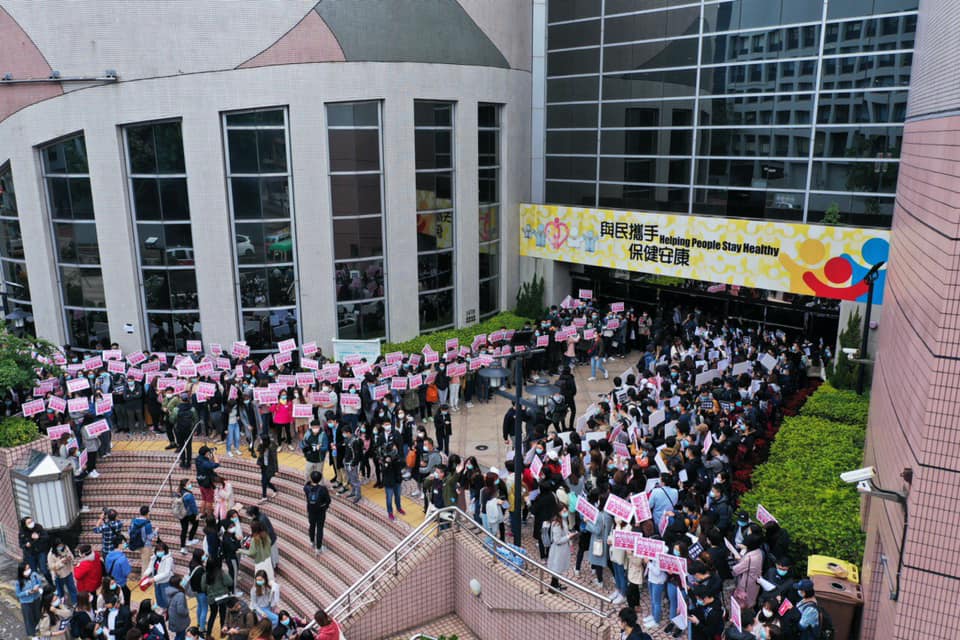Dr Chan, a medic who works in the respiratory department at a local public hospital, was one of those chosen to be in the so-called “dirty team” following a random draw.
“Dirty team” members work in quarantine wards and treat patients infected with the new coronavirus, which continues to spread in mainland China and Hong Kong, as well as around the globe.
As of this week, there have been over 30,000 confirmed cases and more than 630 deaths globally, according to official figures. There have been 24 cases in Hong Kong and a 39-year-old patient died at the Princess Margaret Hospital on Tuesday, where new virus patients are sent.

Chan said that many doctors have wanted to go on strike or resign in recent weeks over the government’s refusal to fully close the mainland border. He said the number of patients will increase dramatically if the government does not take more forthright action.
Chan, who has been a public hospital doctor for a decade, told HKFP that there were other reasons for discontent among local medics. There has been, not only a shortage of face masks, but also a lack of eye goggles, boots and shoe covers: “I am just angry that [the Hospital Authority] are not doing all they can,” he said.
The Hospital Authority Employees Alliance (HAEA), a new union formed just two months ago out of the anti-extradition law movement, has seen more than 18,000 people sign up. They make up a significant proportion of the 80,000 people who man the city’s public hospitals. Staff were already working at near maximum levels before the new virus outbreak.
The HAEA has urged the government to close all border checkpoints connecting Hong Kong and the mainland, but the government has so far refused to close all of the ports. The HAEA launched the first phase of a limited strike on Monday; the government responded by closing more ports but stopped short of closing them all.

Negotiations between HAEA and the Hospital Authority top management broke down on Monday night, and thousands of staff entered the second phase of a week-long strike immediately.
After the second phase of the strike was announced, the Hospital Authority sent notices to staff members who had informed their workplace that they would take part, demanding that they report for duty.
“HA does not support our staff participating in the strike as healthcare staff play a critical role to safeguard the health of people of Hong Kong. You are expected to report for duty according to your work schedule and please be informed that your taking part in the strike during your work hours is not agreed or consented to by HA and no permission is granted. If you wish to take part in the strike, you can only do so in compliance with the laws of Hong Kong,” it said.
Article 27 of the Basic Law states that “Hong Kong residents shall have freedom of speech, of the press and of publication; freedom of association, of assembly, of procession and of demonstration; and the right and freedom to form and join trade unions, and to strike.”
Difficult to resign
Chan, who intended to go on strike, said the members of the “dirty team” at his hospital were chosen using a random computer draw of qualified doctors. Those who were qualified only included mid-level physicians, he said.

Beginner-level physicians – who have not completed the tests usually done around the fourth year of their residency – were not included in the draw. Nor were high-level physicians at, or above, the rank of associate consultant.
“There is no ideal draw system. But I think associate consultants should join the draw,” Chan said.
At least four nurses and a clerk at Queen Elizabeth Hospital resigned last week after they were picked to join the dirty team, according to local newspaper Ming Pao citing two sources in its report. Three of the five chose to pay the Authority in lieu of notice and quit immediately, a source said.
Chan said many doctors had considered resigning, but it was almost impossible for him and other doctors.
“I have a wife and children. I have a mortgage. I have just paid my taxes. I can’t urgently pay two months of salary in lieu to resign,” he said.
Doctors of the resident rank normally earn between HK$75,000 and HK$140,000 per month, according to Chan.

He said nurses earn relatively less and they would be more likely to resign: “It is easier for nurses to migrate overseas, or switch to the private sector. It is very difficult for doctors.”
Fear of infection
Chan said medical professionals at every ward feared contact with patients who may have the new coronavirus, since they may only show a few symptoms before they are confirmed as infected.
“We didn’t have enough manpower [even before the new virus outbreak]. Now we are separated into [normal team and] dirty team, the situation will only be more difficult. The waiting time for patients will be even longer,” he said.
Chan said he has seen cases where patients intentionally hid the fact that they had come to Hong Kong from the mainland.

Chief Executive Carrie Lam said on Tuesday that she understood that some with suspected and confirmed cases of new coronavirus may have lied about their travel history. She said the Hospital Authority had set up an electronic system for medical professionals to check if patients had records of leaving Hong Kong recently.
In one case, Chan said a patient tried to avoid a temperature check. He found the patient’s residential address was in the mainland only by reading their personal information sheet: “I only knew the patient had a fever after finding a staff member to measure the temperature,” he said.
“An even bigger problem is that we don’t know the identities of the relatives, who our patients visited during Lunar New Year, and we don’t know which part of the mainland the relatives were from,” he added.
He added that a larger outbreak may occur in Hong Kong between the upcoming Saturday and Tuesday. This is because Hongkongers who returned from the mainland after visiting relatives at Lunar New Year may start showing symptoms as the two week incubation period passes.

University of Hong Kong microbiology professor Yuen Kwok-yung, an expert on infectious diseases, said in a Commercial Radio interview last Saturday that it was reasonable for medical professionals to ask for the closure of border checkpoints, and the public should not criticise them for striking.
“Most of them [are striking] not because they fear death, but because they have many grievances,” he said. “I believe the government has been trying hard to do so [close the border], but there are some things that they can do and some things that they cannot do.”
Strike action
Chan said he was joining the strike to urge the government to provide sufficient protective gear and also to close the border.
The government first closed six of 14 border checkpoints last Thursday. After the first phase of the strike on Monday, the government closed three more checkpoints, but the Shenzhen Bay Port, the Hong Kong-Zhuhai-Macao Bridge, and the airport remain open. From Saturday, arrivals from China will have to “self-quarantine” at home, the authorities also announced.

Chan said he believed the strike had forced the government to compromise, although Chief Executive Carrie Lam denied she was responding to pressure from medics: “Those using extreme means to try to force the government’s hand will not succeed,” she said.
Chan added that he will discuss with his union colleagues what to do after the second phase of the strike.
“I understand that immigration [policy] is not up to Hong Kong,” Chan said. “This is the only way to force them to close the border. This is the last resort.”
